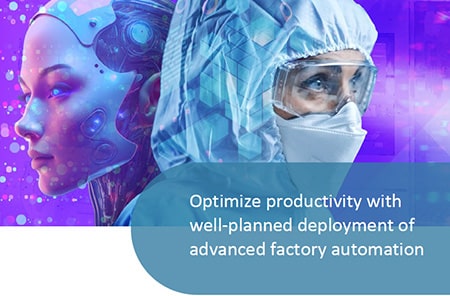Nutritional manufacturers generally operate their processes conservatively. Quality Attributes are controlled with a large safety margin to ensure that the product remains in-specification, even in the face of raw material and process disturbances. Advanced Process Control (APC) can reduce the amount of process variability to enable the process to be pushed much closer to quality or operational limits. This can achieve energy savings, improve sustainability and increase throughput and yield.
APC is an umbrella term for many types of control and optimization technologies that are more advanced than traditional regulatory control. Model Predictive Control is one well established technique, where Machine Learning (ML) is utilized to build a dynamic data driven model of the process. Today, APC technologies are evolving to utilize other ML techniques such as reinforcement learning. As APC learns about the manufacturing process, the knowledge gained is used to automatically adjust the process controls to achieve optimal performance in line with defined KPIs.
The SmartFactory Rx® NutriAPC solution has been developed to support the nutritional industry in improving profitability, equipment efficiency and sustainability.
Benefit analysis
Manufacturing nutritional powders comes with many challenges and targets. These can include controlling moisture content in powders, increasing product throughput, handling many different formulations, adapting to changing environments and minimizing energy usage. Processors usually adopt SmartFactory Rx NutriAPC because they know what they want to achieve with their existing assets but aren’t able to do so without deploying more advanced control technology. To assess the potential benefits from deploying a SmartFactory Rx solution, the project team initially conducts a benefits analysis. This will establish a baseline for the current operation to identify gaps and estimate what gains can be achieved.
As APC utilizes data driven models, obtaining “good” data for modelling is a vital first step. Routine operational data isn’t typically sufficient for this purpose. Structured variability is introduced into the process to help the ML algorithms identify the causal relationships needed by the Advanced Process Control.
There needs to be structured variability introduced into the process to make it move the way we want it to move to provide the data for the model. So, what are the next steps?
Building and deploying the model
Once we have the necessary data set, we build ML models of the process and carry out simulations to demonstrate how much we can push it. This also supports earlier estimates of achievable benefits.
At this point, we implement and deploy the solution, SmartFactory Rx NutriMV, which interfaces with existing plant automation systems and takes control of the process. In doing so, it manipulates the principal inputs to the spray dryer to achieve desired results. For example, it might vary the amount of heat put into the spray dryer (air flow and air temperature) or the feed rate (how much liquid is pumped into the dryer). If the spray dryer is preceded by an evaporation process (e.g. a Multiple Effect Evaporator) the model might also control the density of the material being sprayed into the dryer.
In a traditional process without APC, an operator tends to keep these control settings steady according to a standard operating procedure unless a problem occurs (or someone pushes for improvement). In general, this means there are no changes for hours at a time. NutriMV monitors the process and adjusts every 10 to 20 seconds based on the predicted output.
An intelligent system
A data driven model of the process is at the heart of the control. The model is multivariable, meaning it captures the relationships between multiple inputs and multiple outputs. With that knowledge, the APC can move multiple process levers simultaneously.
In making its control moves, the APC directly considers limits on the process levers and outcome. This ensures the APC is operating robustly in a clearly prescribed operating envelope.
Reliable and adaptable
What’s also key is that APC technologies are robust and industrially proven. Once commissioned, well designed APC systems require little in the way of model maintenance. The model will not need to be changed unless the manufacturer implements a significant process change and even then, it is relatively easy to update the model.
A robust model is particularly beneficial in the case of formulated products where a spray dryer potentially has many different product formulations to process. As manufacturers are continually improving their formulae, it’s important that a new model isn’t needed for each new formulation.
Additionally, when handling natural primary ingredients such as milk, the solution adapts to changing feed compositions to accommodate the fact that fat and protein content may vary from season to season and even cow-to-cow.
Conclusion: Tangible Benefits
The Advanced Process Control solution SmartFactory Rx NutriMV has delivered measurable KPI improvements in practical applications, including:
- Throughput increases of between 5 and 10%
- Moisture uplift of typically between 0.2 and 0.5%
- Energy savings of typically 2 to 5 %
- Reduction in the variability of product quality by 30-50%
With this solution, processors across a range of nutri applications such as infant formula, nutritional powders, and cheese production can be more competitive, more efficient and more profitable.


